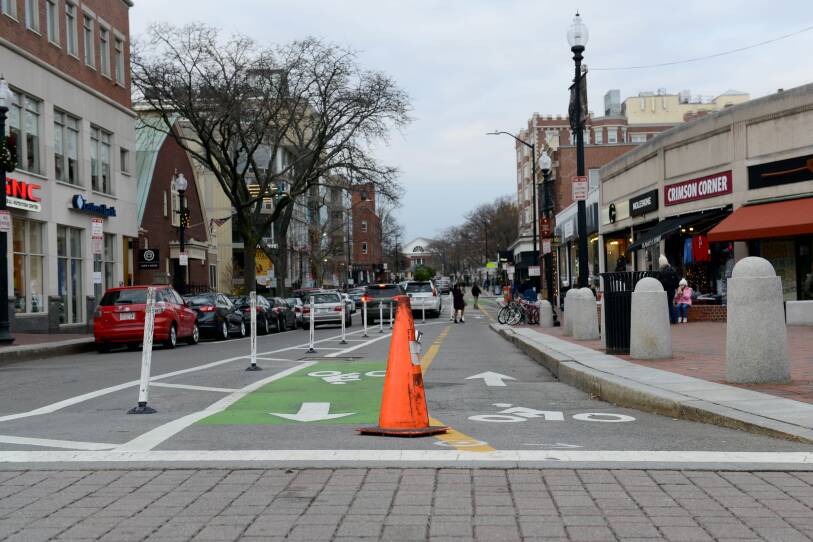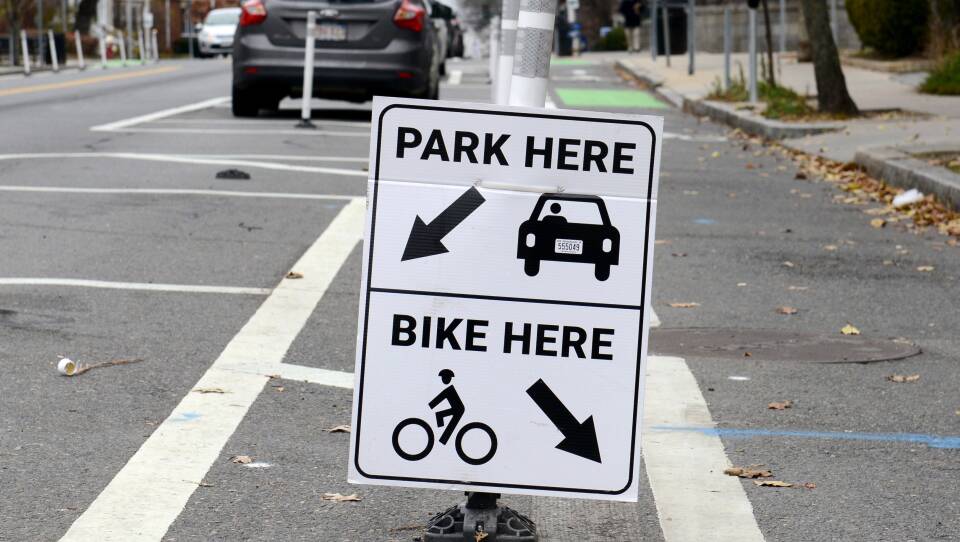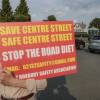Cambridge has been on a tear to build separated bike lanes on city streets over the last four years, setting ambitious targets and bypassing traditional community engagement processes to set up safer biking infrastructure.
But local elections Tuesday night — driven by key issues like housing, building energy efficiency and, yes, bike lanes — made the project’s future murky. Some supportive councilors declined to run for reelection, and one of the program’s most vocal opponents narrowly won a seat on the council.
The divisive push to build nearly 25 miles of separated bike lanes by 2026 has sparked backlash and even a lawsuit. Some residents claim it’s clogged up their streets as cars get backed up in fewer lanes, and some business owners say their foot traffic has plummeted after parking spots were removed on major thoroughfares to make space for bikes. But others are eager to keep propelling the project forward.
One of the strongest supporters of the bike lane network, incumbent councilor Burhan Azeem, was easily reelected with the second-highest number of votes. Looking at Tuesday night’s election results, he sees a mixed bag.
“Five of nine candidates are supportive of bike lanes, but only four of the nine said things are going great as is,” he told GBH News, referring to pledges put out by a local, pro-bike lane advocacy group. “I think that means the bike lanes are going to continue to be built but there may be changes in the future plans.”
More Local News
Jivan Sobrinho-Wheeler, another bike lane supporter — who was ousted in the 2021 election, but re-elected this year — took an optimistic view of the network’s future.
”Five of the top six vote-getters being candidates who voted for the Cycling Safety Ordinance [which created the bike lane plan in 2019] means there is strong support for safer streets in Cambridge,” he said. “I also think that voters sending me back to the Council this year shows that the folks want us to continue to make it easier and safer for pedestrians and cyclists to get around the city.”
Another bike lane supporter easily reelected was Marc McGovern. His view is less sure.
”It’s hard to say,” he said. “It all comes down to Patty.”
Patty Nolan, who just secured a third term on the council, supported bike lanes in the past but did not sign the pledge to finish them in time this year. McGovern says that makes her the swing vote, since six votes would be needed to overturn the original ordinance establishing the 2019 program.
When GBH News asked Nolan why she didn’t sign the pledge this year, as she had in years past, she said it was too divisive.
“With the new council, I believe and hope that the bike lane network will continue to be installed — with more respect and appreciation for the need to listen to all stakeholders and residents,” she said in an interview with GBH News. “I hope that with the election behind us, the divisiveness and hyper rhetoric will lessen, and we can work together to ensure that pedestrian safety and small business concerns are heard and addressed, instead of being dismissed as irrational.
“Bike lanes and small businesses and pedestrian safety do not need to be in conflict — if we do a better job of planning and implementation,” Nolan added.

Although newly elected Joan Pickett received the least number of votes among the nine successful candidates, she was the most vocal about her opposition to the bike lanes. Pickett was a plaintiff in an unsuccessful lawsuit to overturn the ordinance behind the bike lane project.
She told GBH News her concern was as much with the process as the plans.
“The separated bike lane issue is an example of how the City Council did not listen to residents and businesses as they were feeling impacted by what was happening and feeling unheard,” Pickett said. “The bike lanes to me are a symptom of a larger communication issue within the City Council.”
And Nolan told GBH News she is not seeking to dismantle the already-built bike lanes.
“It’s not my intent to do away with anything that exists,” she said. “Can we design our streets to accommodate this infrastructure for separated bike lanes and buses and delivery vehicles and public safety? … I can’t do it by myself, but I'm going to be putting forth the idea that we really do need to be looking at things in a very different way.”
New councilors will be sworn in January 2024.








